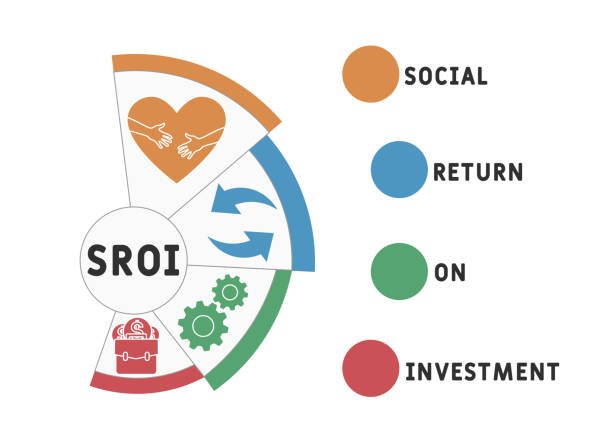The performance of corporation organizations is an essential piece of information for investors and stakeholders. Return on investment is one of the most applied tools to measure the performance of business organizations. It helps investors establish the profitability of a given investment regarding capital. Social return on investment (SROI) measures how an organization adds value to the environment and communities. The change is measured by evaluating the company’s social, economic, and environmental outcomes, which are also the pillars of sustainable development. Social return on investment is an ideal tool for measuring social impacts and should be employed in medium and large corporations. To achieve true sustainability, organizations report on three main aspects: financial gains, as well as social and environmental impacts of their activities, processes, and products. Over the years, financial reporting has been the most dominant way of measuring the performance of corporate organizations. However, with the rising concern Continue reading
Modern Business Concepts
The Factor of Authenticity in the Modern Business
Authenticity has been a popular trend for the past twenty years, and it continues to grow even larger encompassing new areas every year. Nowadays, almost any sphere in the economy has a niche which is devoted strictly to authentic products, which often imply being organic, chemical-free, and manufactured in accordance with ethical principles. This trend was initially started by so-called hipsters who often sold items which they believed to be unique in some way, such as customized jeans or retro sunglasses. Over time, this tendency was identified by market analysts and started being utilized by corporations, for example, Henkel, a German conglomerate, recently launched a brand called Authentic Beauty Concept. The fact that such large companies seek to exploit this idea shows that the authenticity concept is extremely powerful in society. Yet, at its core, authenticity is about people’s desire to discover and consume unique experiences which form their true Continue reading
Sharing Economy Concept – Meaning, Drivers, Principles, and Forms
“Sharing economy” is the term that entered scientific literature not so long ago that is why it is still rarely used. Being also known as ‘collaborative economy’, this term is used to describe a type of business model that builds on the sharing of resources between individuals through peer-2-peer services – allowing customers to access goods and services when needed. The transaction between individuals takes place through sharing economy firms, which are called intermediaries. The intermediaries provide the platform, such as a website or a smartphone app, rather than providing the service directly. Sharing economy firms started to appear in 2008 and 2010, in the aftermath of the global financial crisis, which prompted people to look for new business opportunities. As a business model, the sharing economy takes different forms and is characterized by unique features. More and more people and organizations become involved in the sharing processes currently. The Continue reading
Case Study on Green Marketing: Ecoalf’s Inspiring Business Model
In today’s world, many companies are involved in activities aimed at addressing relevant environmental issues as part of their corporate social responsibility initiatives. However, some ventures conduct their businesses while using solely green marketing as a mechanism to operate by reducing numerous negative impacts on the environment. One of the factors affecting the sustainability of fashion brands negatively is competition. Some businesses in this sector use radically distinctive development models, which allows them to keep the intermittent interest of the target market. However, without having a reputable history, this is difficult for companies to overcome the competitive barrier. As a result, high competition in such an environment affects the sustainability of brands and can often be an obstacle. The inability to withstand pressure from rivals, in turn, is directly associated with falling profits and, consequently, financial challenges. One of the trends in the fashion industry is the focus on environmental Continue reading
Over Dependence on Technology – Discussion
The era of inventions and discoveries began long time ago and more inventions are currently being developed as an attempt is being made to adjust into the world’s increasing competitive environment. Technological developments have been expressed in a variety of fields in the economic, social and even political aspects of life. One of the fields that have currently experienced technological developments is communication. Technologies in communication have experienced great developments in the past few decades; developments that have seen the transformation of people’s behavior and lifestyle. Significant in the latest technological developments is the introduction of the wireless world of communication. Just three decades ago, communication was characterized by elements like telephone booths, dependence on books for information and many elements of communication were more analogue. Without the wireless form of communication, communication faces the limitation of geographical distances, for instance one has to get a telephone booth in order to Continue reading
Platformized Societies – Meaning, Opportunities, and Threats
Changes in the economic and social structures of modern societies have seen the emergence of new platforms for business and socializing. The concept of a platform society has emerged from this trend and it refers to the use of digital markets to complete transactions or foster social engagements. The concept of the platform society is contested because researchers have varied limits of accepting the above description. Nonetheless, globally, five technology companies dominate the digital market space and dominate traffic across major internet platforms. They include Google, Facebook, Apple, Amazon and Microsoft. Collectively, they have the power to shape the geopolitical landscape of human populations through their controls on information exchange and discussions that occur on their platforms. Jointly, these tech companies have billions of users, which means they control knowledge flow to a degree. This extensive power attracts concerns from skeptics who highlight the potential for information manipulation and censorship Continue reading




